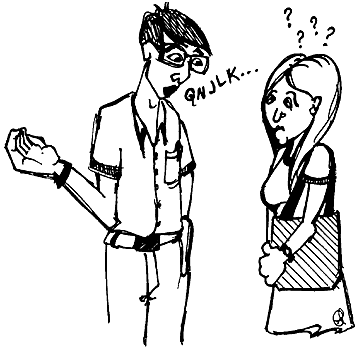
Illustration by Patricia Tompkins.
|
|
By Katie Paulson
Arizona Daily Wildcat
August 23, 2005
Print this
Ideally, university administrators created the position of teaching assistant in order for those graduate students to serve as the voice of the professor but on a much more abbreviated pay scale. But while they are encouraged to communicate with TAs in lieu of tracking down the professor, undergraduates are facing mounting difficulties in actually understanding international assistants.
With more foreign-born graduate students filling the coveted roles of teaching assistants, students across the U.S. are dealing with communication barriers because of different language impediments. At the UA, out of the 1,400 teaching assistants currently employed, about 25 percent are international graduate students. While this doesn't necessarily imply that all international students struggle with English, this 25 percent does indicate that the UA needs to pay special attention to assisting International Teaching Assistants (ITAs) acclimate to a new culture.
Stories float around campus every semester regarding that organic chemistry TA who provided unintelligible responses to students' inquiries, which therefore resulted in half of the class failing. Or the teaching assistants thick accent marred the lectures, so students spend 50 minutes staring at the wall instead of listening to the topic.
With all these sob stories, what does the UA do in order to minimize the clash in language barriers?
Besides the mandatory TOEFL (Test of English of a Second Language) for non-native English speakers as well as the basic SPEAK test, the UA has presented a seemingly lax attitude toward ensuring teaching assistant qualifications that include effective oral communication. Most admissions into the graduate program are based solely on academics; in fact, most prospective students never experience formal interviews.
Therefore, test scores are the only guides that faculty use to put teaching assistants into their new positions. Simply because teaching assistants pass the standardized exams does not directly suggest that they are capable of communicating with a classroom full of students. While new teaching assistants receive training for how to deal with broad and more complex communication issues, they can still struggle with the much more simplistic matter of communicating clearly.
Luckily, hope exists on the horizon. After dealing with numerous complaints over the years regarding this hot button issue, the Arizona Parents Association contributed a grant to the Graduate College in order to further develop training for international teaching assistants.
Dianne Horgan, associate dean of the Graduate College, said, "Numerous programs are taking shape that will alleviate such difficulties in the transfer process. This includes work with the retention office and preceptor classes. Undergraduate preceptors can contribute to an overall improvement of ITA training by providing feedback on how well classes taught by ITAs are run."
One idea still in the planning stages involves a cross-cultural listening program, which will force stronger lines of communication between undergraduate and graduate students. Moreover, new courses are available this semester specifically for international graduate students. The entire focus of one class is simply pronunciation; specifically, this particular class is geared toward international students who speak English well but with a heavy accent.
Furthermore, the ITA program is currently developing a mentoring agenda. Again, this is to allow experienced TAs to bestow advice upon fresh international recruits. While this doesn't necessarily assist the overall problem in communication, those who have dealt with language difficulties can offer suggestions to new TAs.
It's easy for native English-speaking students to complain when struggling to understand foreign-born instructors. Interestingly, this exposes the very weakness of native English speakers.
The UA prides itself on its international graduate program. Some of the most intelligent individuals in the world reside on campus and have spent years educating others. Unfortunately, in the areas where these smart individuals excel (think the science and engineering programs), the majority of American students aren't able to comprehend the material. Therefore, students need to put in the extra effort to hammer out communication confusion in order to both actively learn and understand the material.
Most importantly, students need to realize that dealing with language barriers is a precursor to real-world situations. Businesses, economies, even government entities thrive on the global market. Think of how much the U.S. relies on the world. When administrators of the national government work with other top international leaders, they encounter the exact same issues as students do with teaching assistants. One could view it as the UA serving as the microcosm of this macrocosm in issue of language.
While shifting one's complete mindset on this issue may be too radical, it's important for us to understand that after the university puts new programs into place, it's up to students to work with international teaching assistants themselves in order to remove verbal blockades.
Katie Paulson is a junior majoring in English and political science who secretly pines for that international label. She can be reached at letters@wildcat.arizona.edu.
